Inside Pogacar's time trial comeback at the Tour de France
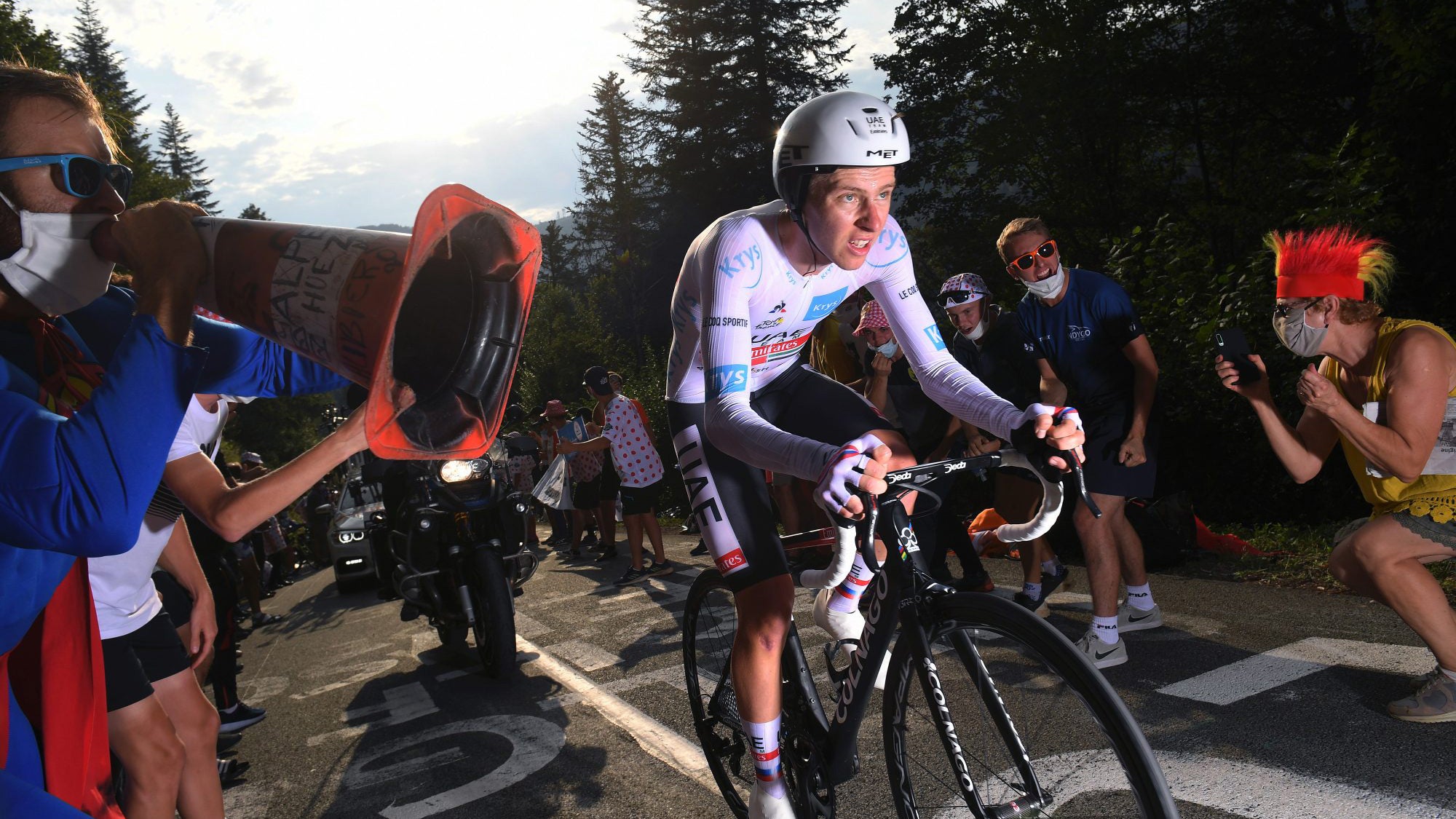
Pogacar's 2020 time trial turnaround was one of the most dramatic results in Tour history. (Photo: Tim de Waele/Getty Images)
Much is being made of Tadej Pogačar’s final-hour reversal in Saturday’s 36.2km individual time trial ending atop the first-category La Planche des Belles Filles to cap the 2020 Tour de France.
And rightly so. It’s the most dramatic late-race comeback since Greg LeMond turned the tables on Laurent Fignon in 1989.
Pogačar uncorked a superb time trial, turning a 57-second deficit into a 59-second margin of victory against Primož Roglič (Jumbo-Visma) to win the yellow jersey at the ripe age of 21.
To some, it appeared the time trial performance “came out of nowhere,” yet behind the scenes, Pogačar and UAE-Emirates staffers spent months preparing for what everyone in the Tour peloton knew would be a decisive stage.
“We had come here to the TT for a reconnaissance, so I knew what we were going to do and I knew where to accelerate and where to manage the effort,” Pogačar said. “I only had to think about pushing hard from start to finish.”
UAE-Emirates sport director Allan Peiper went over the course in inspection with Pogačar three times, and the former pro sat in the follow car, offering motivation and time splits as the Slovenian hammered up the course.
Starting two minutes ahead of Roglič meant that Jumbo-Visma knew the splits to Pogačar, but UAE-Emirates had enough of real-time information to feed to Pogačar as he poured everything into the pedals.
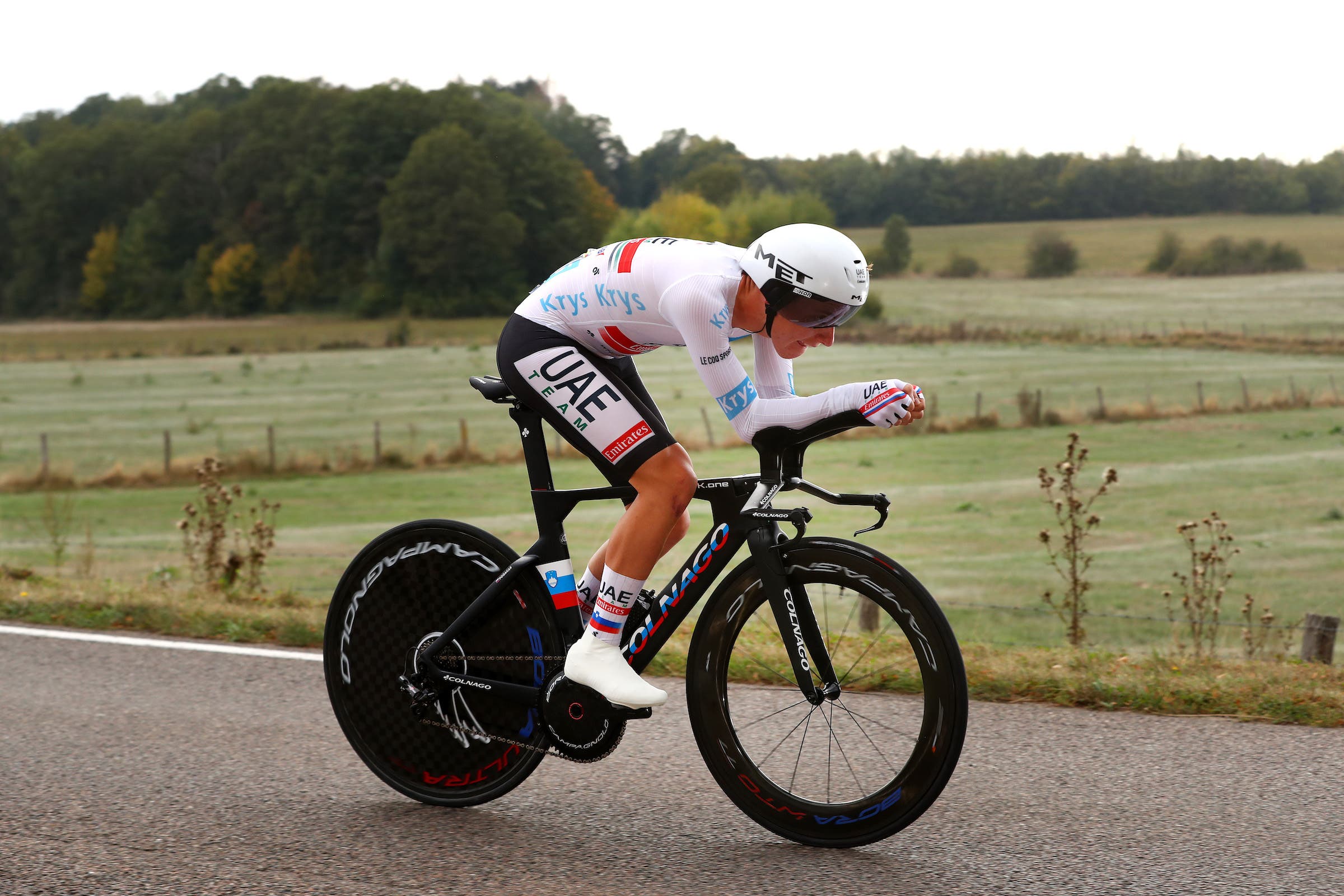
“I didn’t know I was going to have a bad day,” Roglič said. “It’s better when you hear intermediate times, but I was just losing and losing time.”
At the first time split at 14.5km, Pogačar had clawed back 13 seconds to Roglič. There was no panic yet. It appeared Pogačar was racing like he had nothing to lose, and Roglič appeared to be tapping out a more controlled, well-paced effort. When Pogačar flew past his “two-minute man” Miguel Ángel López (Astana) still on the flats, however, it was obvious that Pogačar was flying.
Things were getting dicey by the day’s second time check at 30.3km. Pogačar had taken back 36 seconds to Roglič on the flats, and the hardest part of the course — 6km climb at 8.4 percent — was still to come.
“During the time trial I felt that I was going strong,” Pogačar said. “This pushed me even more.”
Pogačar had bested Roglič on a time trial similar course, albeit half the distance, during the Slovenian national time trial championships in late June. There Pogačar won by only nine seconds, so everyone inside the Jumbo-Visma camp thought even an average performance from Roglič would be enough to secure yellow in Paris.
The world was soon in for a shock. Wout van Aert and Tom Dumoulin, who were waiting at the top of the final climb, could only watch in horror as Pogačar dismantled Roglič bit by bit.
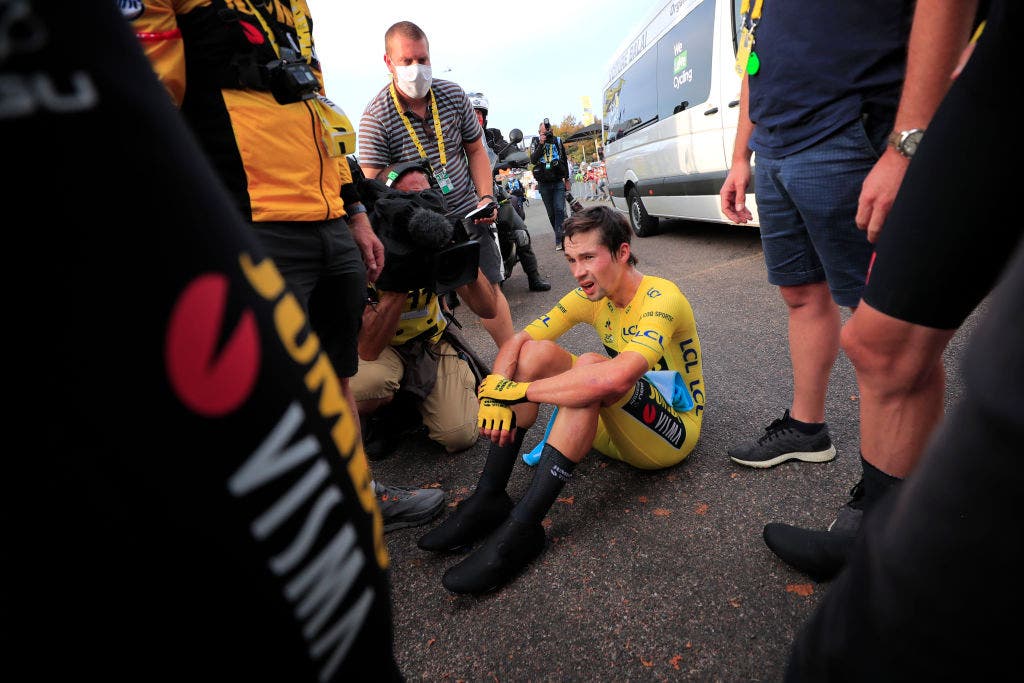
“We hadn’t taken this into account,” Dumoulin said. “This is a big blow. Pogačar was too strong, and he was completely at another level. Primož knew he needed a good time trial, and it wasn’t his best, but it wasn’t bad either.”
Though the pre-stage, 57-second gap Roglič held to Pogačar appeared solid to most observers, insiders at UAE-Emirates were quietly holding out hope that Pogačar still had a chance in the final time trial to win the Tour. The team saw how strong Pogačar was in the final week of the 2019 Vuelta a España, when he dropped the entire peloton in the final mountain stage to win his third of three stages to secure third-place overall.
“We spent two months and a half months preparing for this one stage,” said UAE-Emirates sport director Joxean Fernández. “We had the entire team behind it — mechanics, coaches, technicians, sport directors, everyone was involved. We knew it could decide the Tour.”
One key moment of the race was the bike swap. Fernández said the sport directors and mechanics practiced the bike change maneuver over and over in what would be a small, but critical detail of the race at the base of the Belles Filles climb, where Pogačar swapped out his time trial bike for a lighter climbing bike.
The team studied the best place to do the swap, and when it came down to the moment, it was UAE-Emirates mechanic Vasile Morari who shouldered the pressure to pull it off. At the prescribed stopping point, the team car slammed on the brakes, Pogačar clipped out of the pedals, and Morari scrambled out to dismount the bike from the roof of the car, swap it out with Pogačar, and give him a shove (limited to five seconds by the UCI jury).
“Was I nervous? Maybe a little,” Morari said. “We did many recons with Allan and Tadej in the months leading up to the Tour to find the optimal spot to do the change: where he would leave the bike, the exact position of the car when we stopped — everything was optimized to do it in the quickest possible time. I was happy to play my small part.”
Soigneurs and staffers waited nervously at the top as Pogačar hit the final climb. The gap kept growing. Roglič didn’t have the smoothest bike-swap, and it even appeared that the mechanic gave him a shove that could have seen a sanction from the race jury.
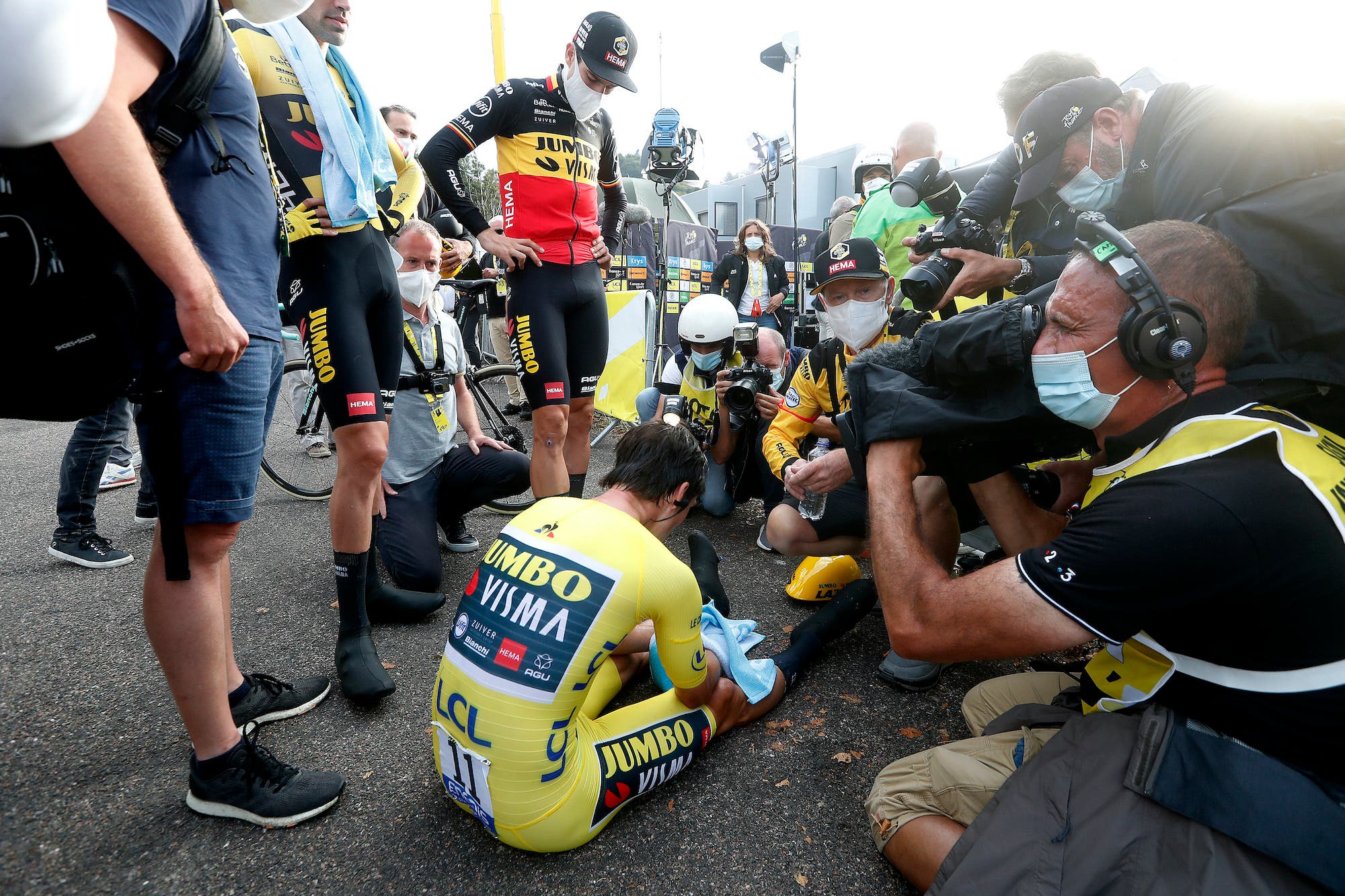
By then, however, smooth bike-swap or not, Roglič was clearly taking on water.
“It hurt my eyes to watch how Primož got into more and more difficulties,” Van Aert said. “He didn’t look as smooth and didn’t have his normal cadence. It is a combination of Pogačar that rode fantastic while Primož did not reach his normal level.”
Once Pogačar hit the final Belles Filles climb, the impossible was unfolding before the eyes of the peloton.
Pogačar had already proven he was among the strongest climbers in the race. Throughout the Tour, he was even or took time on Roglič on every mountain stage, except the Col de la Loze finale, when Pogačar gave up 15 seconds and bonuses to Roglič. After a stalemate in the final mountain stage Thursday, most of the peloton still expected Roglič to fend off Pogačar to win the yellow jersey.
Yet the time trial is the race of truth. For the first time in the entire Tour, Roglič didn’t have his wall of Jumbo-Visma teammates to bull doze the peloton and protect his flanks. Roglič was in full panic mode halfway up the climb. His helmet was askew, and saliva was dripping from his mouth as he tried to produce the power to save the yellow jersey.
At the finish line, Roglič collapsed in disbelief that the maillot jaune that had been so carefully crafted in three weeks of racing had unraveled in little under one hour.
Roglič didn’t have that bad of a performance, finishing fifth on the stage, just 35 seconds behind second-place Dumoulin. What happened is that Pogačar had his absolute best day of the entire Tour right when it counted most.
“I was just hoping Tadej would have some hard moments, so I was pushing myself to believe in myself in the whole parcours,” Roglič said. “I just gave it everything and that’s all I can say. It’s true I didn’t have my best day, and Tadej was in a different world than me.”
Some have been quick to question the credibility of Pogačar’s victory, perhaps even more so because he raced without a power meter, so his exact power numbers are not known. There have been a few murmurs among critics that the time trial was too good to be true. So far, there is no official evidence of anything to suggest otherwise.
Others believe that motors are being used in the Tour. Pogačar’s time trial bike was scanned before the start of the stage, but it is unclear if his swapped-out bike was among the 12 bikes X-rayed after the stage by the UCI’s crew.
VeloNews has learned that the same bike that Pogačar used for the final part of the Belles Filles time trial was disassembled for inspection by UCI technicians at the top of the Col de la Loze in stage 17, the same day that a Jumbo-Visma sport director was ejected from the Tour after losing his temper when Roglič’s bike was also taken apart.
Doubters aside, everyone inside the UAE-Emirates organization was holding out hope that Pogačar could deliver the final-hour turn-around.
“We talked about a top-five overall when the Tour started, but on the second rest day, I told the guys the race was starting to feel a lot like the 2012 Giro,” said UAE-Emirates sport director Peiper on the DeTour de France podcast.
Peiper was the sport director when Canadian Ryder Hesjedal won the 2012 Giro d’Italia, and Peiper was back behind the lead team car at UAE-Emirates after undergoing cancer treatment just a year prior. Peiper said when he was tapped to be the lead sport director for the Tour, he stopped everything and focused obsessively on preparing for the race.
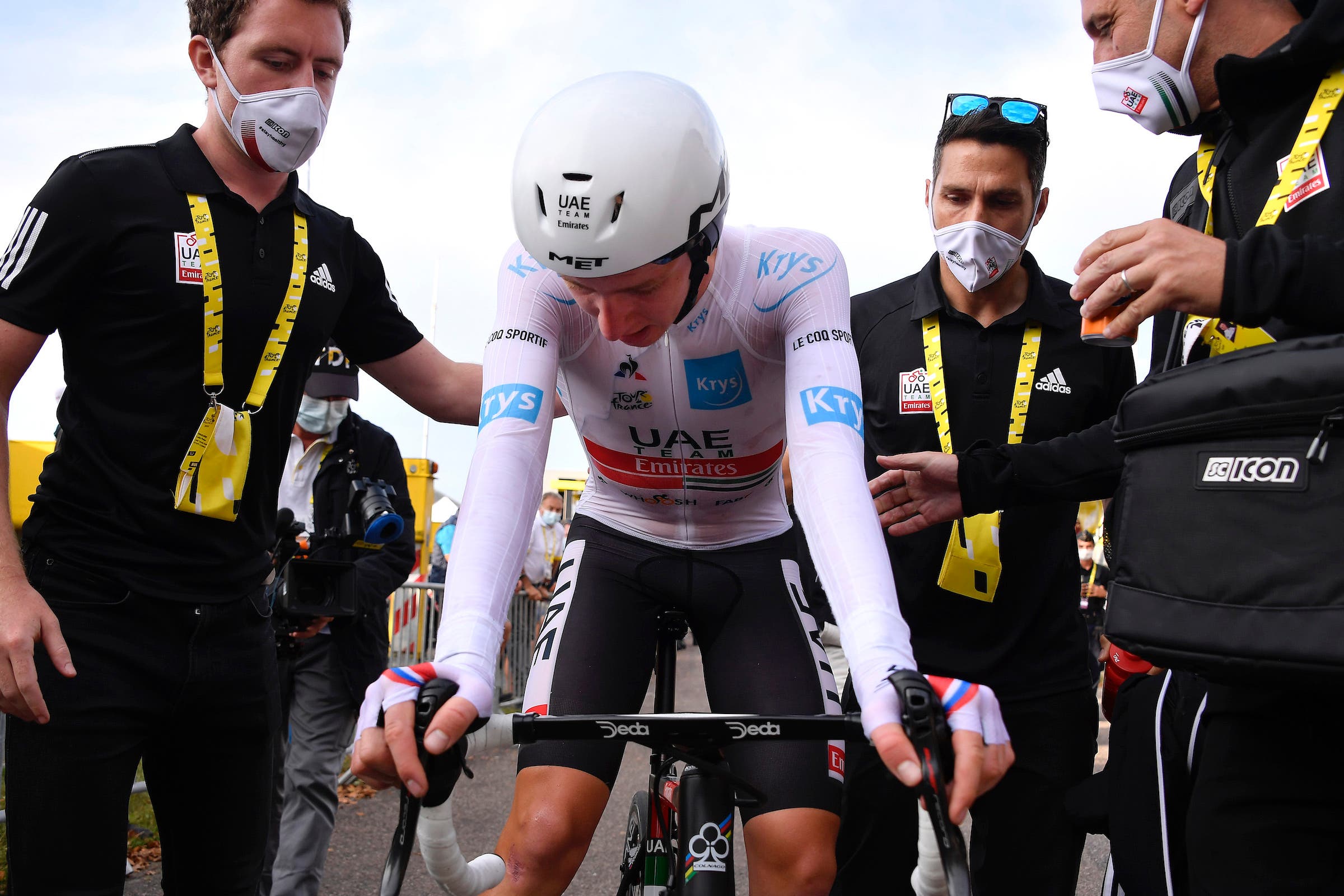
“Things were unfolding in the right way for us,” Peiper said. “You couldn’t write a better scenario. We didn’t have the full strength of the team. The idea scenario was we take the yellow jersey on the final time trial, so we don’t have to defend, and we can slip into Paris in our slippers. … And Tadej pulled it off.”